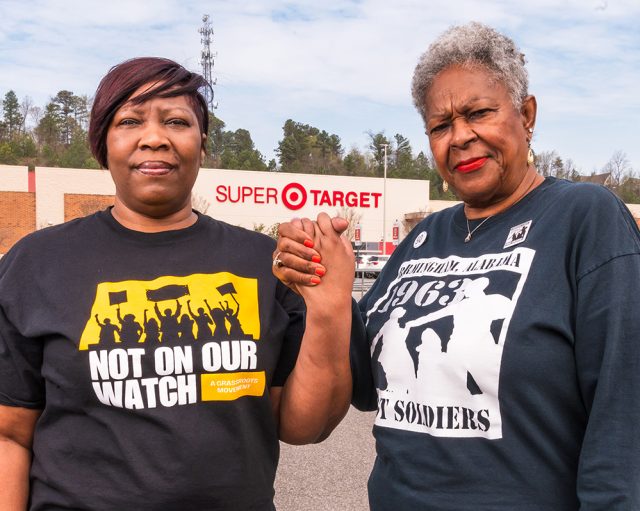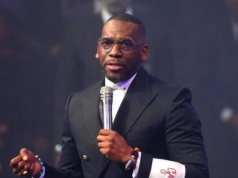
By Sym Posey | The Birmingham Times
As the CEO of Faith and Works, a nonpartisan, social justice organization based in Birmingham, Cara McClure has always been committed to transformative outreach that enhances the quality of life for the underserved and underrepresented.
Now McClure is taking her activism to another level with Not On Our Watch, a newly launched grassroots movement that she feels has been born out of a necessity: holding corporations accountable for abandoning diversity, equity, and inclusion (DEI) initiatives.
“The rollback of DEI programs, in my opinion, is a direct attack on the progress that Black and brown communities have fought for,” she told The Birmingham Times. “These programs were never about special treatment. They were about exactly what our work stands for: fair access, representation, and dismantling systemic barriers [that] have historically excluded us.”
By abandoning DEI, McClure said, “[Corporations] are sending a message about our voices, our talents, and contributions. They are saying [Black people] don’t matter, but they still want our dollars. To us that is unacceptable. If corporations turn their backs on DEI, our goal is to turn our backs on them economically. … Not On Our Watch is about holding [corporations] accountable and ensuring that our progress is not erased.”
Paulette Roby was 13 years old during the children’s marches in Birmingham in the early 1960s. She now serves as chair of the Civil Rights Activist Committee at the Foot Soldiers Headquarters in downtown Birmingham. She spent time recently bridging the two generations of activists when she met with McClure at the historic A.G. Gaston Motel in Birmingham and outside the Super Target in Hoover, Alabama, which has been the focus of boycotts because of its DEI rollbacks.

“When I was coming up, the elders held our hands,” Roby told McClure. “They showed us the way. They shared their wisdom with us. And I will be with you all the way. I’m going to walk with you, and I’m going to stay with you to make sure things are done right.”
April 1963 saw the beginning of the Birmingham Campaign — a coordinated series of direct-action protests led by the Rev. Fred Shuttlesworth-founded Alabama Christian Movement for Human Rights (ACMHR) and joined by the Dr. Martin Luther King, Jr. and the Southern Christian Leadership Conference (SCLC).
Their mission was clear: to challenge the city’s system of segregation head-on through nonviolent protest. What followed—Project C, mass arrests, the Children’s Crusade—captured the attention of the nation and the world. The courage shown by everyday people in Birmingham helped pave the way for the Civil Rights Act of 1964.
Boycotts in the 1960s were more than withholding dollars from the white business establishments, said Roby: “It is very important for us to spend our money in our own communities and with our own people because it will help us maintain what we already have and make it greater.”
Not Business-as-Usual
Not on Our Watch is inspired by the spirit and success of historic boycotts, such as the Selective Buying Campaign in Birmingham and the Montgomery Bus Boycott, which leveraged economic power as a tool for justice and equity, McClure said.

“We aim to disrupt business-as-usual for corporations that turn their backs on DEI, while uplifting businesses that remain committed to fostering inclusion and equity,” she said.
For those who wonder whether boycotts are still effective today, “history has shown that economic pressure works,” McClure said.
“For instance, the Montgomery Bus Boycott forced the desegregation of buses. Companies listen when their profits are threatened. They only understand one language, and that is money. When we strategically withdraw dollars, we force change,” she said.
Not on Our Watch is more than a boycott, McClure continued.
“It is about corporate accountability. The purpose of this is not a new boycott. We are standing in solidarity with the boycotts that are ongoing. … And because people forget, we want to keep it on the forefront of people’s minds that we need to keep this going for as long as we can. The bus boycotts were strategic, and we plan to be strategic, as well.”
Motivation to Change
McClure, a Birmingham native, grew up in different parts of the city, mostly Powderly. She graduated from West End High School in 1987 and attended Jacksonville State University, as well as Alabama State University.
The 55-year-old McClure didn’t get her start into activism until 2014, after it was announced that officer Darren Wilson would not be charged with the shooting death of Michael Brown, an unarmed 18-year-old in St. Louis, Missouri. McClure recalled the moment she found out and how it set her on a path to create change.
“I was out with Lamar [Black], co-founder and team member of Faith and Works], and we were visiting the motel where the Rev. Dr. Martin Luther King was murdered, the Lorraine Motel in Memphis, Tennessee. After we left there, we went to a restaurant, and we saw on the television that the murderer of Mike Brown was acquitted.
“We were very shocked. A few minutes later, I got a call from [my son], Brandon [McClure, who is also member of the Faith and Works team], and he was like, ‘Your generation dropped the ball.’”
That moment “was everything,” McClure remembered.
“I think that is important for us because [Brandon] talked about how my generation could have done more to continue the fight after the Civil Rights Movement. … After he said that and we had lengthy conversation, I said to him, ‘When I got back home, I am going to find something to do.’”
Full-Circle Moment
Roby, 75, learned the meaning of civil disobedience when she was 13 years old. As a teen who grew up in the South Town Projects in Birmingham, Roby took part in the demonstrations and marches.
She left her home state in 1969, moving to San Diego, California, where her uncle owned a hotel, club, and record store that were all located in the city. She lived on the West Coast for 25 years and returned to Birmingham in 1986. She was surprised by the changes she found.
“When I left Birmingham in 1969, we didn’t have Black police officers. [By 1986], we were beginning to have Black police officers, Black firemen, and Black people working for the gas company, the power company. I saw a difference,” Roby told Variety magazine in an interview last summer.
Roby got involved in local Democratic politics and wound up landing a job that she never saw coming. It marked a full-circle moment for the teenage Civil Rights activist, given the importance of bus boycotts by Black residents in the history of the Civil Rights Movement.
“I went back, landed a job at the Birmingham-Jefferson County Transit Authority, and ended up driving the bus myself. … That was really a big experience for me. I loved it,” she said.
Speaking about McClure and today’s marchers, Roby said, “The road forward will not be easy.”
“Voting is a must,” she continued. “That is the only way your voice is going to be heard. … And keep your faith—that’s one of the main things.”
Goals of Not On Our Watch
Corporate Accountability. Demand the reinstatement and expansion of DEI programs by targeted corporations.
Economic Justice. Promote alternative businesses that prioritize DEI and align with the values of marginalized communities.
Community Mobilization. Educate and activate communities to participate in sustained, impactful boycotts and advocacy efforts.
Public Awareness. Raise awareness about the importance of DEI programs and the consequences of corporate abandonment.
Mass Community Engagement. Mobilize 100,000 Alabamians to pledge their commitment to the boycott and spread awareness through their networks.
Faith and Justice Intersection. Engage Black churches and faith-based communities as pillars of economic justice.
For more visit www.notonourwatch.net




